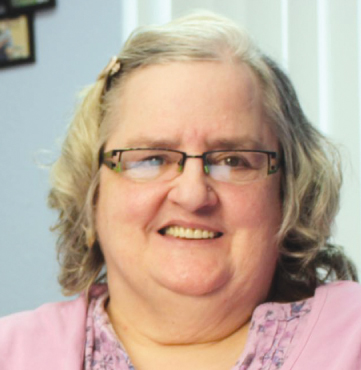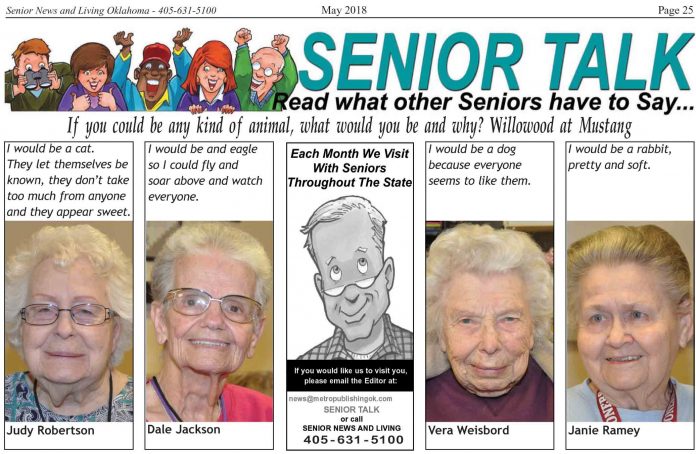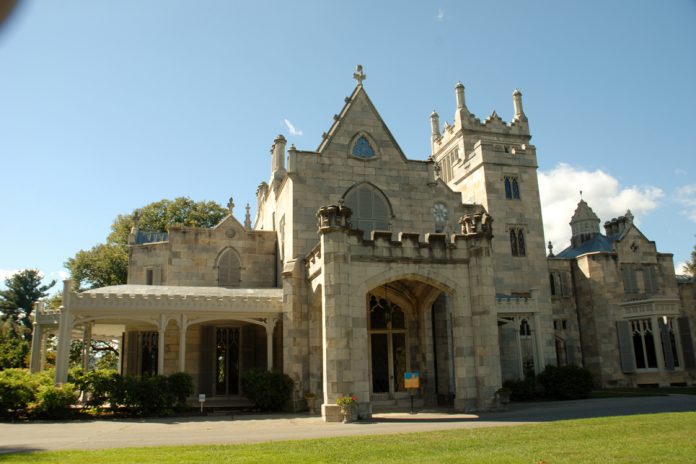OMRF scientist Rizwan Qaisar has been awarded an Irene Diamond Fund/AFAR Postdoctoral Transition Award in Aging.
The award, presented by the American Federation for Aging Research (AFAR) with support from the Irene Diamond Fund, will provide $120,000 in flexible transitional funding to Qaisar, who is researching age-related muscle loss called sarcopenia at OMRF. Postdocs are individuals conducting research after finishing their doctoral studies and are pursuing further training and a well-defined career path.
AFAR is a leading nonprofit dedicated to advancing healthy aging through biomedical research. The goal of this program, according to AFAR, is to provide portable and flexible transitional funding for senior postdoctoral fellows as they develop and negotiate for faculty positions and research programs. The award provides full-time research training and grant support. Founded in 1981, AFAR has awarded more than $175 million in grants to investigators and students across the U.S., Ireland, Israel, Italy and the United Kingdom.
“By giving these postdoctoral fellows this extra boost at a critical moment in their career path, AFAR is helping create a research pipeline that is essential to advancing better therapies for age-related diseases and discoveries that will help us all live healthier and longer,” said Jeremy Walston, M.D., Chair of the 2017 Selection Committee for the Irene Diamond Fund/AFAR Postdoctoral Transition Awards in Aging.
At OMRF, Qaisar works in the Aging and Metabolism Research Program with under the guidance of Program Chair Holly Van Remmen, Ph.D. looking specifically at the role of oxidative stress, or free radicals, in the long-term deterioration of muscle. Qaisar researches potential interventions for the disease pathways for sarcopenia, specifically the activation of the SERCA ATPase.
Qaisar earned his Ph.D. at the University of Uppsala, Sweden. His academic focus was looking at the mechanisms of muscle aging, and evaluating potential therapies to counter age-related weakness and muscle loss.
“I am extremely grateful and honored to receive this award,” said Qaisar. “This funding will provide me with a real opportunity to push my research forward and make a difference for our aging population.”
OMRF postdoc receives national aging reward

OU Physicians Names Chief Administrative Officer
Kevin Elledge has been named chief administrative officer for OU Physicians, the physician practice of the University of Oklahoma College of Medicine.
In his new role, Elledge will work closely with OU Physician leadership to advance the mission of patient care across the OU Health Sciences Center enterprise. He will be responsible for the collective business and operational performance of the OU Physicians clinical practice, including the provision of core practice management services, revenue cycle functions, financial management, clinical operations, strategy development, information technology and analytics. Elledge will support the delivery of high-quality patient care across OU Physicians practice divisions and clinical units and will ensure coordination with the University’s missions of education and research.
Elledge has more than 14 years of experience with OU Physicians, most recently serving as the executive director of operations.
“As interim chief administrative officer, Kevin has worked tirelessly and very effectively to advance a number of important initiatives for our group,” said OU Physicians President Jesus Medina, M.D. “He has earned my respect as a trustworthy administrator, manager and leader. I am excited to continue working with him for the benefit of our organization.”
Elledge holds a bachelor’s degree in Computer Science from the University of Central Oklahoma. Prior to joining OU Physicians, he resided in Atlanta where he founded and operated a successful healthcare technology company.
With more than 1,000 doctors and advanced practice providers, OU Physicians is the state’s largest physician group. The practice encompasses almost every adult and child specialty. Many OU Physicians have expertise in the management of complex conditions that is unavailable anywhere else in the state, region or sometimes even the nation. Some have pioneered surgical procedures or innovations in patient care that are world firsts.
DARLENE FRANKLIN: GOD’S TRAFFIC LIGHT
I ran a red light without realizing it, and oh, what consequences I’ve suffered.
Everyone knows it’s dangerous to look at the sun. I didn’t know the dimness of my room in the nursing home where I live would turn me into a bat, ill equipped to handle bright sunshine. Light, long my friend, has become my enemy.
I fell in love with light as a child, relishing the long summer days where the sun shone late into the night. I lived in Maine, where the sun rises earlier than anywhere else in the United States, and I took advantage of the release from winter’s doldrums.
That changed when I moved into a nursing home, with only my window to mark the passing hours. I rarely go outside, but one day I decided to record a radio interview in the backyard. My aides set me up under a spacious tree at midsummer.
As soon as I rolled into the bright sunshine, I went blind. Unlike when I was younger, the lens of my eyes failed to adapt to the additional light. As long as I was outside, a white haze replaced the words and pictures on my computer screen.
I started having problems when I was indoors as well. The doctor said it was a consequence of growing older. The more I thought about it, I decided it also came from the eyestrain of constantly looking at a computer.
I earned my vision problems with every passing year. How many days have I passed with the white-faced monster as my constant companion? The dark confines of my room have only made it worse. If I heard reports about potential eye strain, I ignored them, a self-made victim of the “it won’t happen to me” syndrome.
I didn’t just ignore those reports, I also misread God’s traffic signs. Instead of paying attention when flashing lights warned me to “slow down,” I continued full speed ahead. When the color turned red, I stopped writing—but remained on the computer to read or chat with friends.
My computer consumption turned into an obsession with unexpected consequences.
A series of disasters kept slowing me down. Computer files disappeared. A false heart attack alarm sent me to the hospital for three days. My computer crashed, and then I struggled with the learning curve on the new machine.
In response, I worked harder. My computer remained on all hours of the day or night, because I saw no alternative between a full stop and work. I knew God didn’t want me to quit writing. Somehow my present weakness would showcase God’s strength.
After much mourning, meditation, and messing around, I realized the simplicity of the solution. Just pay attention to God’s stoplights.
Perhaps because I’d spent a dozen years mostly writing with a red light, I cherish the green lights. And lately, God has blessed me. I’ve committed to paid writing opportunities over the next year, as well as my monthly column.
God showed me that didn’t mean I should write without ceasing. I tend to say “yes” when asked to write something, even for free. Instead I should pause to consider the warning signs and proceed with caution. Sometimes I should refuse altogether.
I’ve also learned to limit time spent on my computer. I set a timer for an hour and focus on writing. When the alarm goes off, I close the computer for fifteen minutes. There’s plenty of writing, pre-writing, planning, and researching I can do without my computer. Sometimes I even write longhand as I did at first, while riding a bus to work.
Red lights are the hardest for me to put into practice. When my brain turns to mush, I no longer fight my need to rest. My goal is to stay off the computer all day Sunday. The Lord’s my work and my rest that day.
The funny thing is, when I pay attention to God’s traffic lights, I get more done than ever.
Green, Yellow, Red
Walk-a-thon for the needy,
God always says go
But He may signal
a change to slow
For protection, He
pulls full stop
Refresh and renew
at God’s rest stop
Pursue His leading
when He says go
Searching, seeking,
switch to slow
What wonders are missed
in the rush past slow
Labor in the fields
until the Boss says stop
Protected and fed,
then alarm sounds go
Go in love, slow to anger,
until the day we stop
100 Years Strong
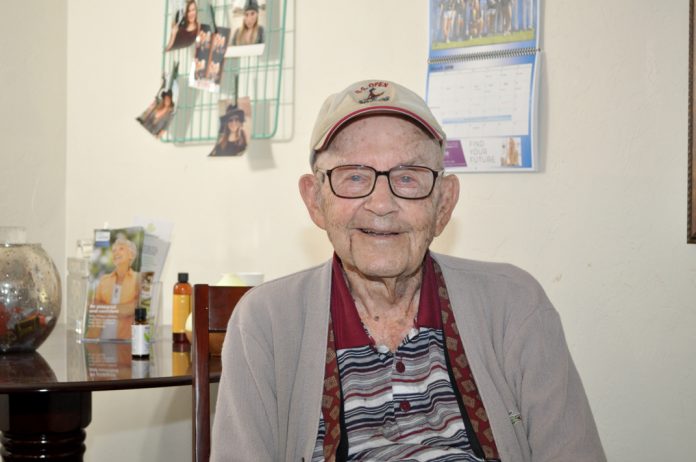
by Vickie Jenkins, staff writer
One of the residents at Heritage Assisted Living has been getting a little extra attention lately. Not only is he an all-around-good-guy but he has reached a milestone in his life. He is 100 years young! His name is Jack Bryant, a Navy Veteran who served his country in WWII.
Born in Oklahoma City, OK, Bryant likes to share his stories about his life. When Bryant was six years old, his mother had some medical issues and at the time, it was best for Bryant to move in with his grandmother. “I loved my grandmother very much and she took care of me. Her house was 3 blocks from the grade school and 4 blocks from junior high so I was within walking distance so it worked out great for me.”
“When I was six, I didn’t mind the walking to school, even though the 3 blocks seemed much longer back then,” Bryant said. “They didn’t have anything like a bus,” he added. “It didn’t matter what the weather was like. Even if it snowed, all of the kids in the neighborhood walked to school.”
“I was around 8 years old when I became a working boy! I delivered The Daily Oklahoman newspaper!” he said in a stern voice. “Now, back then, the only form of news was the newspaper. The paper ruled everything! If someone wanted to buy a house or buy a car, they would look at the newspaper. That’s just the way it was.”
“I enjoyed living with my grandmother. She was set in her ways but she allowed me to ‘be myself.’ She showed me how to treat others, teaching me respect. She allowed me to make my own decisions, teaching me responsibility. She taught me that my opinion mattered, teaching me how to stand up for myself. I’ll have to say, living with my grandmother was the best thing that could have happened to me. She taught me about life.”
At age 14, Bryant moved back in with his parents. His folks moved several times over the years and he graduated from Classen high school in Oklahoma City, OK.
The next thing I knew, Bryant started talking about cars. “My first car was a Ford Model A. I’ll never forget that ole thing. I was driving all over the place at the age of 15! Age didn’t matter back then,” Bryant paused for a moment, setting up tall and straight with pride in his voice and said, “You know, I drove for 85 years and never got a ticket.”
Going down memory lane, Bryant began talking about how he met his wife, Ella. “I was in the Navy, stationed at Daytona Beach, Florida. The USO was in town and they were having a dance that night. A friend and I were coming back to our barracks when we heard music in the distance; coming from the big building across the street. My friend mentioned that he was going to go check it out and he wanted me to come along. I didn’t really want to and we argued a few minutes and then, I figured I would. So, here we go, off to the dance! As we got closer to the building, the music was louder and louder…and then, I stood in the doorway. When I entered the room, there were men on one side of the room and women on the other. We were to choose who we wanted to dance with. I saw a pretty, young woman glancin’ my way and I walked over and asked her to dance. That’s how it all started,…she was the girl of my dreams and it wasn’t long after, we got married. I can remember the details of that dance like it was yesterday,” he said. “The rest is history. We were married for 71 wonderful years.”
Bryant was in the Navy for 3 years. After getting out of the military, Bryant worked for B.C. Clark Jewelers here in Oklahoma City. “Ella and I lived in the Village area, raising 3 boys there. Those were some of the best times of my life,” Bryant said.
Bryant is a kind, individual, storyteller that lived a good life and continues on. Serving his country in the U.S, Navy, Veteran of WWII, married to Ella for 71 years and enjoys spending time with his sons and their families as often as he can.
Bryant has made many friends along the way and will continue to do so.
A heartfelt thank you to Jack Bryant and all of the Veterans that served their country! You made a difference in our lives. Thank you!
Ten Oklahoma Fallen Officers to be added to National Memorial
Ten (10) law enforcement officers who died in the line of duty in Oklahoma will be among the three hundred and sixty (360) new names to be engraved on the National Law Enforcement Officer’s Memorial in Washington, D.C. Those names will be dedicated during the 30th Annual Candle Light Vigil the evening of May 13, 2018. Officers being added from Oklahoma are:
Payne County Deputy Sheriff Shack Palmer, died December.10, 1911, from gunshot wounds that he received late the evening of December 8th attempting an arrest near Fisher;
Bristow Police Detective William H. Johnston, died September 20, 1924, when his car crashed a mile north of Bristow attempting to intercept some Kellyville bank robbers;
Perkins Police Officer Henry L. Cotton, died April 29, 1986, from complications following surgery for injuries sustained during a fight making an arrest March 28th;
Logan County Deputy Sheriff Edward J. Wright, died October 23, 2016, after suffering an on duty heart attack late the evening of October 20th;
Oklahoma Department of Corrections Corporal Stephen R. Jenkins, Jr,, died January 7, 2017, from a heart attack he suffered after chasing an inmate with contraband at the Clara Waters Correctional Center in Oklahoma City;
Sac & Fox Nation Police Officer Nathan B. Graves, died January 24, 2017, about 6 a.m. in a head on traffic accident 11 miles north of Stroud on Highway 99 ;
Craig County Deputy Sheriff Sean F. Cookson, died February 27, 2017, from injuries sustained in a traffic accident the morning of February 22nd while in route to training;
Tecumseh Police Officer Justin M. Terney, died March 28, 2017, after being shot twice during a traffic stop about 11:30 p.m. the night before;
Logan County Deputy Sheriff David J. Wade, died April. 18, 2017, shortly after being shot several times while serving an eviction notice in Mulhall;
Oklahoma Highway Patrol Lieutenant D. Heath Meyer, died July 24, 2017, from injuries sustained when he was accidently struck late the evening of July 14th by an OHP unit after he laid out stop sticks for a pursuit north bound on I-35 near NE 27th Street in Moore.
For more information on these officers and the other almost eight hundred officers who have died in the line of duty in Oklahoma, both before and after statehood, go to the Oklahoma Law Enforcement Memorial web site at www.oklemem.com.
SENIOR TALK: If you could be any kind of animal, what would you be and why?
If you could be any kind of animal, what would you be and why? Willowood at Mustang
I would be a cat. They let themselves be known, they don’t take too much from anyone and they appear sweet.
Judy Robertson
I would be and eagle so I could fly and soar above and watch everyone.
Dale Jackson
I would be a dog because everyone seems to like them.
Vera Weisbord
I would be a rabbit, pretty and soft.
Janie Ramey
Wish of a Lifetime Program
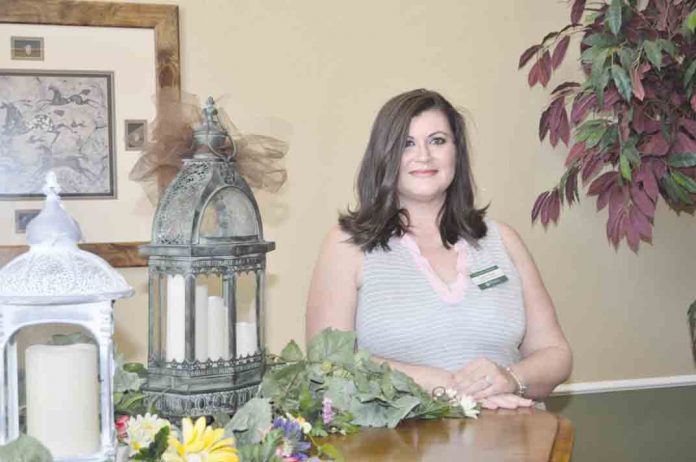
Vickie Jenkins, Staff Writer
Are you looking for an assisted living facility for your loved one? Well, look no farther. Willowood at Mustang offers gracious living in a home-like setting with dedicated and knowledgeable staff available 24 hours a day to meet the personal needs of each resident.
In addition to the assisted living services, Willowood provides a completely self-contained, secure memory care unit for those with Alzheimer’s and memory-related dementias.
There is someone special at Willowood that is sure to make you feel welcome as you walk into the spacious entrance with beautiful decor. That person is Carolyn Spears, Life Enrichment Coordinator. This is Carolyn’s first year at Willowood and she has already made a difference in resident’s lives.
Carolyn started a program at this facility called Wish of a Lifetime program through the Jerry Bloom foundation. “This is a program where the resident requests a wish; something they have always wanted to do but never could. The members of the Wish of a Lifetime committee, in Colorado decide which resident gets their wish granted. All wishes are considered and much thought goes to each decision. Not all wishes are granted.”
“I think every senior deserves a chance to make their wish come true,” Carolyn said. “This year, 7 wishes have been submitted and several have been granted. It is amazing to see the look on the recipient’s face when they realize they have been chosen. It makes it all worth it. Of course, it takes quite a bit of planning from others that go into the Wish of a Lifetime and I am thankful for the people that reach out, allowing the senior’s wishes to come true.”
Giving a few examples of the granted wishes, Carolyn told how one resident wanted to travel to be reunited with his cousin. Another one wanted to go to see a Thunder game, live. They had a staff member go along and a family member and they were able to watch the game. He was thrilled! The wishes can be simple or a little excessive but Willowood tries to make their wish come true.
Being Life Enrichment Coordinator is a rewarding job for Carolyn, getting to know the residents, but it can also be a lot of hard work. As activity director, Carolyn is in charge of a full range of activities; cookouts, outdoor leisure time, trips for shopping, concerts and tours. She also plans all of resident’s daily activities, gets the residents involved in arts and crafts, and gives art lessons.
“It is very important that the residents get involved with activities, stay busy and socialize. When they are involved, it makes for less falls, less stress and less agitation. Of course, the residents enjoy themselves here and that is what we want. We want them to feel comfortable. It’s their home,” Carolyn said.
On a personal note, Carolyn grew up in Arkansas and Oklahoma. “It was kind of like 50/50,” she said. “What a lot of people don’t know is that I started from the ground up. I started out as a CNA, then I became a CMA, ACMA then a state certified Activity Director and I have to say, “When I found this job, it sounded perfect. I love it!” Carolyn said. “I love helping the residents, enjoy planning their activities, working with arts and crafts, going shopping, playing games, enjoy visiting with each person…what more could I ask for?” she added.
Asking Carolyn how she became interested in activity director, she replied, “I have always enjoyed being around people. For as long as I can remember, I have been involved in arts and crafts. I am also a private contract artist. Some of my paintings have been sold all over the country. Most of my work has been sold to private individuals.” Some of Carolyn’s art work is displayed throughout Willowood.
When Carolyn is not working, she enjoys spending time with her husband and her twin daughters, 17 and daughter 13. She is also an advocate for Fibromyalgia and MS and leads an Alzheimer’s Association support group once a month.
Asking Carolyn what her favorite part of her job would be, she simply answered, “To be involved and learn wisdom from the ones that are around me.”
If you would like to learn more about Willowood at Mustang, Meridian Senior Living, they are located at 1017 W. Highway 152. For more information, call 405-376-1200 where someone will be glad to answer your questions.
Mercy Sweeps Top National Quality Rankings
Independent studies place Mercy in the lead for quality of care and patient safety
Shorter hospital stays, fewer complications and better patient results are just a few metrics used to rank Mercy as a leading health care organization. For the third year in a row, Mercy is one of the top five large U.S. health systems in the 2018 Watson Health 15 Top Health System study. In addition, Mercy Hospital Oklahoma City received an “A” safety grade from The Leapfrog Group, an independent hospital watchdog group, in ratings released today.
“This level of national recognition reflects the hard work of countless co-workers who care for our patients every single day,” said Jim Gebhart, president of Mercy Hospital Oklahoma City and regional strategy officer. “We have made these efforts across many communities and many states because, like the Sisters of Mercy before us, we are dedicated to providing exceptional care for all.”
The Watson Health study, formerly the Truven Health Analytics study, analyzes 338 health systems and 2,422 hospitals across the U.S. Leapfrog Hospital Safety Scores assign A, B, C, D and F letter grades to 2,500 hospitals nationwide, providing the most complete picture of patient safety in the U.S. health care system.
Both Watson and Leapfrog combine rigorous analysis of individual hospital performance and metrics by using objective, independent research and public data sources. Hospitals and health systems do not apply for consideration.
Mercy outperformed peers in the following ways:
*Saved more lives and caused fewer patient complications
*Lower cost of care
*Readmitted patients less frequently
*Shorter wait times in emergency departments
*Shorter hospital stays
*Better patient safety
*Higher patient satisfaction
Some of the keys to improving the quality of patient care have included efforts made possible because of Mercy’s dedicated team, leading technology and best practices:
* Hand hygiene, while seemingly simple, is difficult to enforce, especially across an organization with 40,000 co-workers. By establishing Mercy-wide goals and putting rigorous plans in place, Mercy has reduced one of the most common health-care associated infections, Clostridium difficile (C-diff), by 67 percent from 2016 to the present.
* With more than 2,000 integrated physicians – one of the largest medical groups in the nation – Mercy brings primary care and specialty doctors together to implement proven, clinical-based best practices to improve patient care.
* Mercy was among the first health care organizations in the U.S. to have an integrated electronic health record (EHR) connecting all points of care. With a finely-tuned EHR, clinical best practices can be hard-wired into the system, resulting in triggers that warn of possible complications at very early stages, as well as data that can help reduce variation and improve compliance.
* Specialty councils, made up of physicians, nurses and clinicians, represent more than 40 areas of medicine, providing best practices for everything from heart surgery to the delivery of babies.
“This award speaks to the engagement of our staff and physicians in the journey toward high quality, reliable care,” said Terri-Anne Bone, vice president of performance improvement for Mercy Hospital Oklahoma City. “While the award recognizes our efforts to date, we know that there is work to be done. The kind of diligence our co-workers demonstrate will enable Mercy to continue to improve care in the future.”
Mercy Hospital Oklahoma City was also recently named one of the nation’s 100 Top Hospitals® by IBM Watson Health. In addition, Mercy Hospital Oklahoma City was one of only 13 hospitals in the nation to receive the Everest Award, achieving the highest national benchmarks along with the greatest improvement over five consecutive years.
TRAVEL/ ENTERTAINMENT: Touring Westchester County New York

Photography and Text by Terry “Travels with Terry” Zinn t4z@aol.com
How does one in 700 words or less describe all the variety of attractions that Westchester County New York holds? Well, one doesn’t, or better yet can’t. But in a quick visit I did enjoy all my stops along the very convenient ribbon of parkways that can speed you from one historic landmark to another or to another delightful dining experience.
My oasis for this visit was the expansive and convenient Doubletree in Tarrytown. With an extensive breakfast buffet with hot egg option included, you can be off and touring quickly on your own schedule. A good night’s rest is mandatory to supply you with the energy you will need each day. This Doubletree in Tarrytown delivers.
The 19th century was a period of political and technological change in America. Romanticism dominated the arts, and as the movement emphasized the appreciation of nature, imagination and emotion, the Hudson River Valley became the center of painting and architecture. Wealthy patrons commissioned the construction of mansions in a variety of styles along the bluffs of the river from New York City to Albany. Lyndhurst is one of these. Overlooking the Hudson River in Tarrytown, New York, Lyndhurst is one of America’s finest Gothic Revival mansions. Former New York City mayor William Paulding, merchant George Merritt and railroad tycoon Jay Gould were all its inhabitants.
Kykuit, the Rockefeller estate is a must tour. This expansive mansion and grounds tour is a popular attraction and you must make reservation for your visit at the Phillipsburg Manor Visitor Center, and a courtesy bus will take you from the ticket outlet and gift shop up the hill and around the circular drive. Personal cars are not permitted. The proprietors of this property are quite proud of their charge to preserve while sharing this American palace so be prepared for enforcement of strict rules while touring. The art gallery, if on your tour, gives one pause as to the real meaning of what is art and what is not?
The cottage of Washington Irving’s, Sunnyside, is a delight to tour or if you come too late for a formal tour, just grazing the grounds and setting, next to the Hudson and railroad track, is a fun meandering. Further investigation in to the life and contributions of Irving, is enlightening to see his influence of the times in which he lived. Not only giving us the tales of Sleep Hollow and the Headless Horseman, but coining such words we take for granted today, such as Gotham- referring to New York City. The Sleepy Hollow cemetery is a wealth of frozen history with such notables residing there as, Elizabeth Arden, Andrew Carnegie and William Rockefeller. Roaming its hill expanse, one can meander to the Old Church and cemetery, and down to the reconstructed Headless Horseman Bridge.
If you feel over loaded (and you shouldn’t) with historic places, modern entertainment at the Westchester Broadway Theater should be on your itinerary. They produce professionally presented musicals in a dinner theatre style. While just exploring the parkways and byways of Westchester and without planning one may happen upon a delightful restful moment. We came upon the Red Hat On The River bar and restaurant cozied up to the massive Hudson River. It’s curiosity quenching moments like this spontaneous beverage stop that the well-traveled embrace and relish as special memories.
But for a top of the sky, upscale dining option few can compare to the 42nd, atop the Ritz Carlton in White Plains. The cocktail lounge with spectacular views of the Hudson valley, setting sun and downtown, and the accompanying several restaurants, are the “in” place to dine in the center of Westchester County
Just when I thought we had experienced the best of Westchester dining, an evening setting sun cocktail and appetizers of Portabella mushroom and a Risotto at the historic Castle on the Hudson, offered us its plethora of charmed atmosphere as we sat on the outside patio of this mansion. While we were relaxing and recounting our few days of adventure, a pair of young dear wandered on the lawn beneath our table, as if on cue, having their dusk appetizer of young sprouts. Westchester County has its magic and is a grand entry into the Historic Hudson Valley, with many more locales, mansions, and dining experiences awaiting the discriminating traveler. www.westchestertourism.com
Mr. Terry Zinn – Travel Editor
Past President: International Food Wine and Travel Writers Association
http://realtraveladventures.com/author/zin
May/June AARP Drivers Safety Classes
Date/ Day/ Location/ Time/ Registration #/ Instructor
May 3/ May 3/ Thursday/ Okla. City/ 9 am – 3:30 pm/ 951-2277/ Varacchi Integris 3rd Age Life Center – 5100 N. Brookline, Suite 100
May 5/ Saturday/ Midwest City/ 9 am – 3:30 pm/ 473-9239/
Williams First Christian Church – 11950 E. Reno Ave.
May 15/ Tuesday/ Norman/ 9 am – 3:30 pm/ 307-3177/ Palinsky
Norman Regional Hospital – 901 N. Porter Ave
May 11/ Friday/ Okla. City/ 9 am – 3:30 pm/ 951-2277/ Edwards
S.W. Medical Center – 4200 S. Douglas, Suite B-10
May 8/ Tuesday/ Midwest City/ 9 am – 3:30 pm/ 691-4091/ Palinsky
Rose State Conventional Learning Center – 6191 Tinker Diagonol
May15/ Tuesday/ Norman/ 9 am – 3;30 pm/ 360-5300/Schaumberg
1at Baptist Church Family Life Center – 300 W. Commanche
May 16/ Wednesday/ Warr Acres/ 8:30 am – 3 pm/ 789-9892/ Kruck Warr Acres Community Center – 4301 N. Ann Arbor Ave.
May 21/ Monday/ Shawnee/ 9:30 am – 3:45 pm/ 818-2916/ Brase
Shawnee Senior Center – 401 N. Bell St.
May 24/ Thursday/ Midwest City/ 9 AM – 3:30 pm/ 405-739-1200/ Edwards Midwest City Senior Center – 8251 E. Reno Ave.
The prices for the classes are: $15 for AARP members and $20 for Non-AARP. Call John Palinsky, zone coordinator for the Oklahoma City area at 405-691-4091 or send mail to: johnpalinsky@sbcglobal.net




